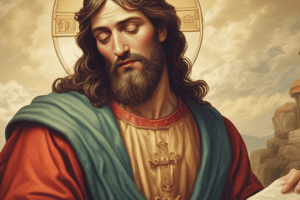Podcast
Questions and Answers
What does St. James warn against in addition to not putting God at the center of planning?
What does St. James warn against in addition to not putting God at the center of planning?
- The sin of commission
- The sin of oppression
- The sin of omission (correct)
- The sin of greed
Who is St. James referring to in James 5:1-6?
Who is St. James referring to in James 5:1-6?
- The rich who have become rich unfairly (correct)
- The faithful rich
- The poor who are oppressed
- The youth who are seeking riches
What is the purpose of the Sacrament of the Unction of the Sick?
What is the purpose of the Sacrament of the Unction of the Sick?
- To heal the body and forgive sins (correct)
- To heal only the body
- To forgive only sins
- To prove one's faithfulness
What is necessary for the healing of the sick according to St. James?
What is necessary for the healing of the sick according to St. James?
What is the importance of the work of faith in James 5:19, 20?
What is the importance of the work of faith in James 5:19, 20?
Study Notes
The Epistle of St. James
- The Epistle of St. James is one of the 7 Catholic epistles in the New Testament.
- It is called "Catholic" because it was not written to a specific person or church, but to all Christians.
- The writer of the Epistle is St. James, the cousin of Lord Jesus Christ and the bishop of Jerusalem.
Theme and Purpose
- The Epistle of St. James offers instruction for those experiencing problems such as persecution, economic injustice, poverty, apostasy, and fragmentations within the Church.
- St. James aims to rekindle true living faith and encourages repentance, patience, and self-control.
Trials and Perseverance
- Trials are outward circumstances faced by all believers, such as conflicts, sufferings, and troubles.
- Trials are not pleasant, but they can improve and purify our faith, producing patience and endurance.
- The Godly reactions to trials are joy and perseverance.
Wisdom for Trials
- St. James encourages us to find faith in a relationship with God through prayer.
- We should request knowledge, understanding, and correct judgment to deal with life's trials.
- The wisdom of God does not necessarily get us out of trouble, but it gives us insight on how to learn from troubles and difficulties.
Temptations
- God does not tempt us, but we are tempted when we are drawn away from God by our desires.
- We fall into temptations because we allow ourselves to do so.
- Sin grows and ultimately brings death: separation from God spiritually and physically.
The Corrective: Hear and Do
- As children of God, we must be swift to hear, slow to speak, and slow to anger.
- We must uproot the seeds of evil and plant the seeds of the Word of God.
- We must restrain our tongues, be merciful to others, and be unspotted from the world.
Faith and Works
- St. James emphasizes the essential relationship between faith and works.
- Three examples of faith and works are:
- Mastery over speech: what proceeds out of the mouth flows from the heart.
- Ministry to the needy: faithful Christians must be the guardians of the poor.
- Moral purity in thought and deed: a traditional indicator of a working faith.
The Law of Love
- St. James warns us against judging others by earthly standards of rank, wealth, achievements, and appearance.
- A person's dignity and worth come from God, not from fellow humans.
- Favoring the rich over the poor is an example of fainthearted faith that comes from unjustly judging and showing partiality.
Faith that Works
- Faith that saves is a "complete" faith, one that trusts and lives with God.
- Complete faith is both faith and works.
- Faith produces works and works makes faith perfect and complete.
The Work of Faith: Controlling What We Say
- St. James warns us about the importance of controlling what we say.
- What we say reveals who and what we are.
- Only by the work of the Holy Spirit within us can the tongue be brought under control.
Godly Counsel
- St. James warns us about counseling others.
- If we are truly wise and understanding, let us show this wisdom with good conduct.
- We should refrain from counseling others with our "wisdom" that can be rooted in pride and sinful passions.
Lack of Faith and Works: Quarrels in the Church
- Wars and fights in the Church are another example of the result of faith without works.
- These disputes come from worldly desires and passions that cause disruption in the body of Christ.
Conquering Pride and Self-Seeking Pleasures
- We can conquer pride and self-seeking pleasures by:
- Stopping prayers for self-centered pleasures.
- Renouncing the world and building a friendship with God.
- Yielding to the Holy Spirit who dwells in us through Chrismation.
- Being humble, recognizing that God resists the proud.
- Resisting Satan and submitting to God.
Criticizing Others
- When we criticize others, it is another example of pride that becomes evident in what we say.
- It is a lack of faith combined with evil works that is an offense to the person and God.
Being Overly Confident
- True faith is to completely depend upon God and to seek ways to do good works.
- We should begin all that we do and say with, "If God wills…"
- We must not boast or be arrogant, as God resists the proud.
Sins of Omission
- Not doing what we know is right is equally sinful as doing something wrong.
- Common sins of omission that youth commit today include:
- Not praying regularly.
- Not attending Church services.
- Not helping those in need.
Warning to Rich Oppressors
- St. James describes in great detail the fate that awaits the unjust rich and how their wealth will condemn them.
- He is referring to those who have become rich unfairly by stealing, cheating, and taking advantage of others.
Encouragement to the Oppressed
- We should stop grumbling at each other, and we must not demand that life be "fair."
- We must be patient and wait on the Lord, realizing that plants do not produce fruit overnight.
- We must not swear by God as a way of proclaiming proof of truthfulness.
The Work of Faith: Healing
- Salvation involves the whole person, body and soul.
- The Sacrament of the Unction of the Sick has a double purpose, the healing of the body and forgiveness of sins.
- Praying and oil are used in combination during the healing of the sick.
Restoration
- St. James tells us the importance of the work of faith in bringing back a fellow Christian who turns away from Christ.
Studying That Suits You
Use AI to generate personalized quizzes and flashcards to suit your learning preferences.
Description
This quiz is about the Catholic Epistles of the New Testament, including the Epistle of St. James, and their significance in the Christian faith. It covers the authorship and audience of these epistles.




